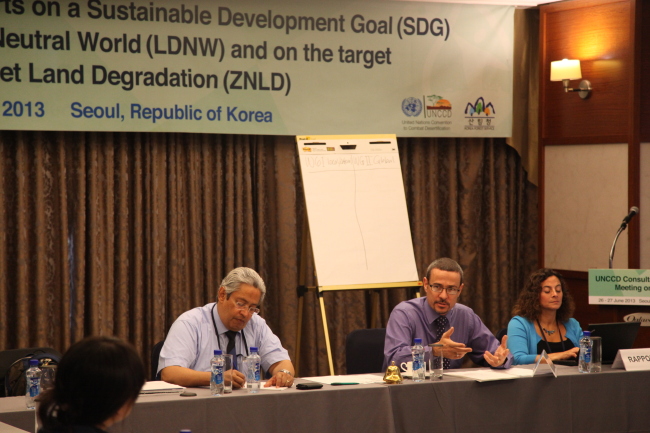Land and soil experts from around the world Thursday called on the international community to set national, regional and international targets to address desertification, land degradation and drought at all levels. The call was issued following a consultative meeting held on June 26-27 in Seoul, Republic of Korea.
At the two-day event hosted by the government of the Republic of Korea and facilitated by the Secretariat of the U.N. Convention to Combat Desertification, or UNCCD, government representatives, scientists and civil society organizations discussed ways to implement the outcomes of the U.N. Conference on Sustainable Development (Rio+20) whereby countries committed to strive to achieve a land-degradation neutral world.
 |
A UNCCD expert meeting gets underway in COEX, southern Seoul, Thursday. (UNCCD) |
The experts agreed that healthy land was a prerequisite for achieving food, water and energy security as well as climate change adaptation and mitigation and biodiversity preservation. They recommended that to halt and reverse current land degradation trends, there was a need to set commonly agreeable targets with indicators to measure progress toward a land-degradation-neutral world.
“We need to make sure that the ambitious vision of a land-degradation-neutral world does not remain a platitude, but is translated into action supported and encouraged by operational and deliverable targets on the national, regional and international levels,” said UNCCD Executive Secretary Luc Gnacadja.
“Experts at this meeting agreed that UNCCD should move to a target-setting approach to measure impact on the ground. We are ready to take this recommendation forward and to assist countries in making the paradigm shift in land stewardship from a degrade-abandon-migrate to a protect-sustain-restore approach.”
The experts stressed that the Rio+20 Conference provided momentum to place land at the center stage of the global sustainable development agenda and to scale up sustainable land management practices. They also agreed that actions to address desertification, land degradation and drought are already happening at the local and national levels, but not at the required scale.
“The successful experience of a series of national forest plans in South Korea, first launched in the early 1970s, proves that rehabilitating land leads to economic growth. Today, forests cover 64 percent of our country and we are eager to share this experience with the world,” Minister of the Korea Forest Service Shin Won-sop said.
“Korea would continue to collaborate with the UNCCD to highlight the importance of sustainable land management at the national and global levels,” Shin added.
The meeting was chaired by Jia Xiaoxia, director of the International Bureau to Combat Desertification, State Forestry Administration, China. The recommendations on goals, targets, indicators and the modalities for implementation, which were discussed at the expert meeting, will be considered at the UNCCD’s 11th Conference of the Parties to be held in Namibia from Sept. 16-27, 2013.
(Source: UNCCD)
About the UNCCD
Desertification, along with climate change and the loss of biodiversity were identified as the greatest challenges to sustainable development during the 1992 Rio Earth Summit.
At Rio+20 in 2012, world leaders agreed to strive to become a land-degradation-neutral world to curb the growing threats of desertification, land degradation and drought. Established in 1994, the UNCCD is the sole legally binding international agreement linking environment, development and the promotion of healthy soils.
The Convention’s 195 parties work to alleviate poverty in dry lands, maintain and restore the land’s productivity, and mitigate the effects of drought.








